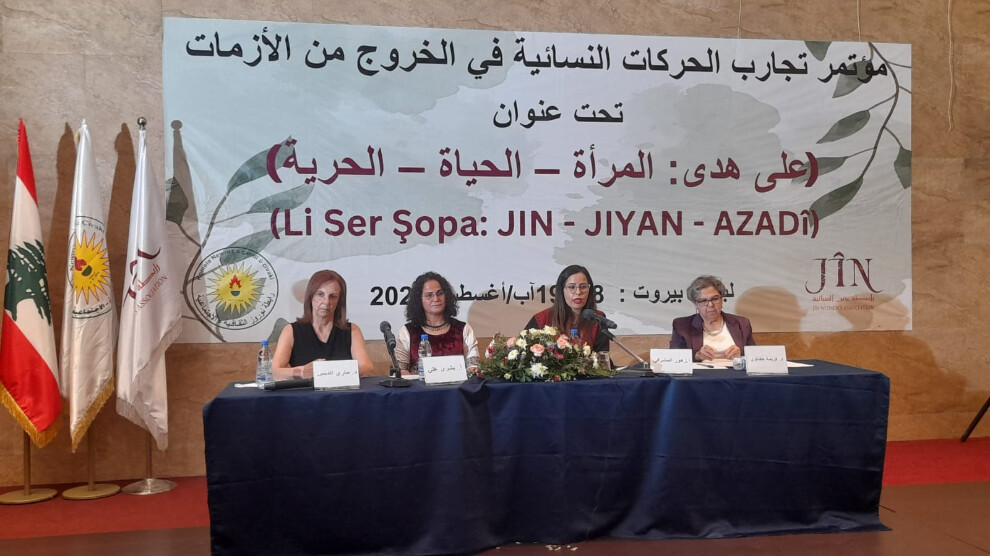International conference of women kicks off in Beirut
Women from 10 Arab and African countries, North-East Syria and Shengal discuss wars and the influence of states on women at an international conference in Beirut.
Women from 10 Arab and African countries, North-East Syria and Shengal discuss wars and the influence of states on women at an international conference in Beirut.

The international women's conference on the experiences of women's movements kicked off in the Lebanese capital, Beirut, on Friday.
Organized by the Jin Women's Association, the Newroz Cultural Association and the Noun Initiative for Abdullah Öcalan's Freedom under the motto “In the Footsteps of Jin, Jiyan, Azadi” (Woman, Life, Freedom), the conference is attended by 80 delegates representing women’s institutions in Tunisia, Jordan, Iraq, Lebanon, Sudan, Turkey, Palestine, Egypt, Syria, Iran, and a delegation from North-East Syria and Shengal.
The two-day conference is divided into four sessions. The first session will discuss the interventions of foreign and especially Western states in Arab countries and their impact on women. The second session will look at how Kurdish women are affected by the crisis and the division of their country. The third session will focus on the situation of women in Iran and Eastern Kurdistan. On the second day of the conference, participants will discuss the role of Abdullah Öcalan in the struggle of women and the connection with his strict isolation in Turkish custody.
Aida Nasrallah, President of the Lebanese Committee for Women's Rights, addressed the discussion topics of the conference in her opening speech and said: "Women are exposed to great injustices and restricted in their freedom in many areas such as politics, society, economy and law.
Hanan Osman, chairperson of the Newroz Cultural Association, welcomed the participants and said: "Your participation underlines the irrepressible will of women. We want to emphasise the importance of women's unity as a basis for peace and freedom. At this conference, we want to respond to feminicide with our common struggle. We will fight all forces that aim to deprive women of their freedom."
During the first session moderated by Sena Xenîme from the Women and Leadership Association, Dr. Marî Dibis, President of the Wardat Boutros - Equality in Women's Work Association, spoke about the uprising of Arab people and its causes, the impact of foreign interventions on Arab women and the Arab Spring.
"The progressive democratic forces could not confront the counter-revolution, because they lived most of their time in prisons, in addition to the fragmentation among them," Dibis said.
She added, "After 12 years, the conditions of women in the Arab world differ from one country to another, but the strategic solution remains to abolish personal statuses that are based on sectarianism, and to put civil laws in their place."
The vice president of the Jin Women's Association, Buşra Elî, spoke about the impact of war and crisis on Kurdish women in a homeland divided by colonial policies. She noted that women are the primary victims in these conflicts and the repercussions of the regime's policies.
Kerîme El Hefnawî from the National Front for Egyptian Women and Their Rights spoke about the situation of African women in a continent that is the major victim of all the crises in the region.
Karima stated that women in Africa have been subjected to violations, including discrimination and physical and sexual violence, noting that 125 million girls under the age of 18 are married.
She added that one out of 3 girls are subjected to physical and sexual violence, and that six African countries do not have a law to protect women against domestic violence.